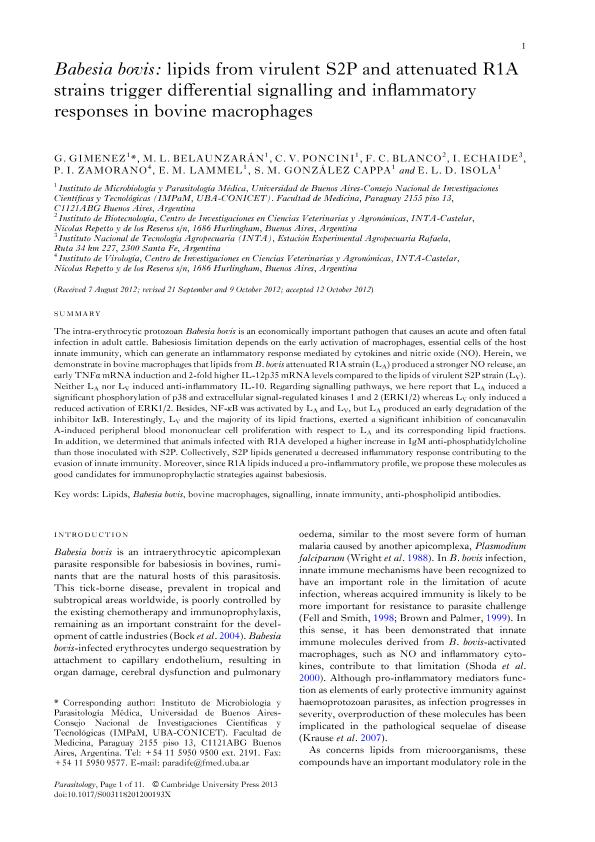Artículo
Babesia bovis: lipids from virulent S2P and attenuated R1A strains trigger differential signalling and inflammatory responses in bovine macrophages
Gimenez, Guadalupe ; Belaunzarán, María Laura
; Belaunzarán, María Laura ; Poncini, Carolina Veronica
; Poncini, Carolina Veronica ; Blanco, Federico Carlos
; Blanco, Federico Carlos ; Echaide, Ignacio Eduardo; Zamorano, Patricia Ines
; Echaide, Ignacio Eduardo; Zamorano, Patricia Ines ; Lammel, Estela Maria
; Lammel, Estela Maria ; Gonzalez, Stella Maris
; Gonzalez, Stella Maris ; Durante de Isola, Elvira Luisa
; Durante de Isola, Elvira Luisa
 ; Belaunzarán, María Laura
; Belaunzarán, María Laura ; Poncini, Carolina Veronica
; Poncini, Carolina Veronica ; Blanco, Federico Carlos
; Blanco, Federico Carlos ; Echaide, Ignacio Eduardo; Zamorano, Patricia Ines
; Echaide, Ignacio Eduardo; Zamorano, Patricia Ines ; Lammel, Estela Maria
; Lammel, Estela Maria ; Gonzalez, Stella Maris
; Gonzalez, Stella Maris ; Durante de Isola, Elvira Luisa
; Durante de Isola, Elvira Luisa
Fecha de publicación:
04/2013
Editorial:
Cambridge University Press
Revista:
Parasitology
ISSN:
0031-1820
Idioma:
Inglés
Tipo de recurso:
Artículo publicado
Clasificación temática:
Resumen
The intra-erythrocytic protozoan Babesia bovis is an economically important pathogen that causes an acute and often fatal infection in adult cattle. Babesiosis limitation depends on the early activation of macrophages, essential cells of the host innate immunity, which can generate an inflammatory response mediated by cytokines and nitric oxide (NO). Herein, we demonstrate in bovine macrophages that lipids from B. bovis attenuated R1A strain (LA) produced a stronger NO release, an early TNFα mRNA induction and 2-fold higher IL-12p35 mRNA levels compared to the lipids of virulent S2P strain (LV). Neither LA nor LV induced anti-inflammatory IL-10. Regarding signalling pathways, we here report that LA induced a significant phosphorylation of p38 and extracellular signal-regulated kinases 1 and 2 (ERK1/2) whereas LV only induced a reduced activation of ERK1/2. Besides, NF-κB was activated by LA and LV, but LA produced an early degradation of the inhibitor IκB. Interestingly, LV and the majority of its lipid fractions, exerted a significant inhibition of concanavalin A-induced peripheral blood mononuclear cell proliferation with respect to LA and its corresponding lipid fractions. In addition, we determined that animals infected with R1A developed a higher increase in IgM anti-phosphatidylcholine than those inoculated with S2P. Collectively, S2P lipids generated a decreased inflammatory response contributing to the evasion of innate immunity. Moreover, since R1A lipids induced a pro-inflammatory profile, we propose these molecules as good candidates for immunoprophylactic strategies against babesiosis.
Archivos asociados
Licencia
Identificadores
Colecciones
Articulos(IMPAM)
Articulos de INSTITUTO DE INVESTIGACIONES EN MICROBIOLOGIA Y PARASITOLOGIA MEDICA
Articulos de INSTITUTO DE INVESTIGACIONES EN MICROBIOLOGIA Y PARASITOLOGIA MEDICA
Articulos(OCA HOUSSAY)
Articulos de OFICINA DE COORDINACION ADMINISTRATIVA HOUSSAY
Articulos de OFICINA DE COORDINACION ADMINISTRATIVA HOUSSAY
Articulos(SEDE CENTRAL)
Articulos de SEDE CENTRAL
Articulos de SEDE CENTRAL
Citación
Gimenez, Guadalupe; Belaunzarán, María Laura; Poncini, Carolina Veronica; Blanco, Federico Carlos; Echaide, Ignacio Eduardo; et al.; Babesia bovis: lipids from virulent S2P and attenuated R1A strains trigger differential signalling and inflammatory responses in bovine macrophages; Cambridge University Press; Parasitology; 140; 4; 4-2013; 530-540
Compartir
Altmétricas



